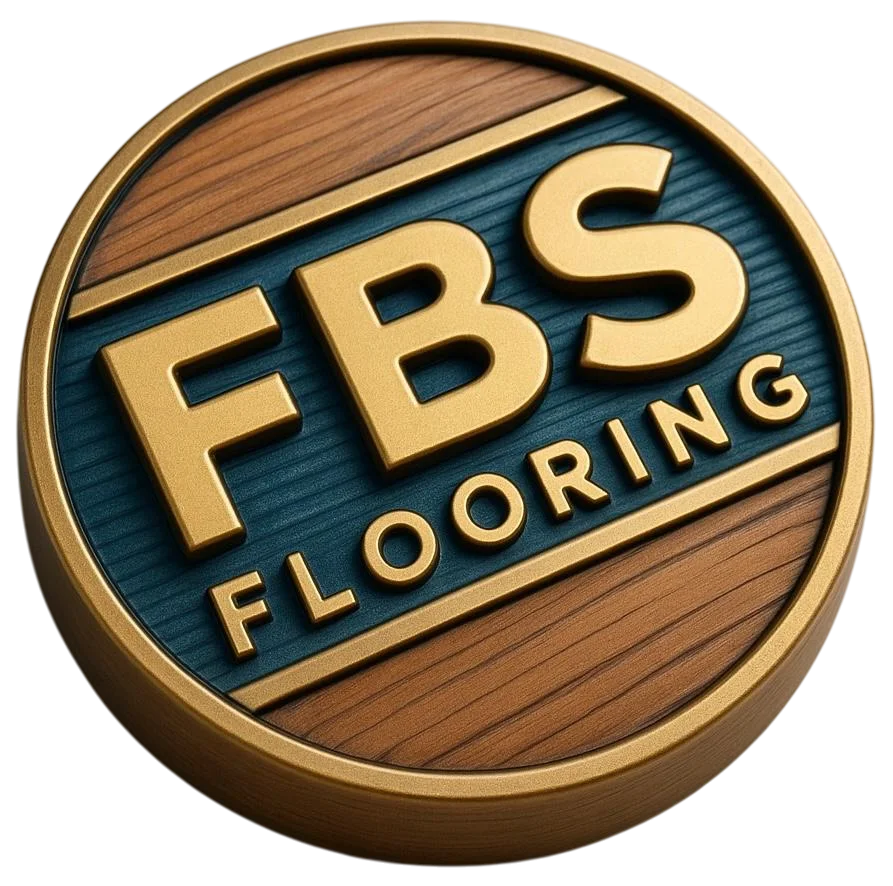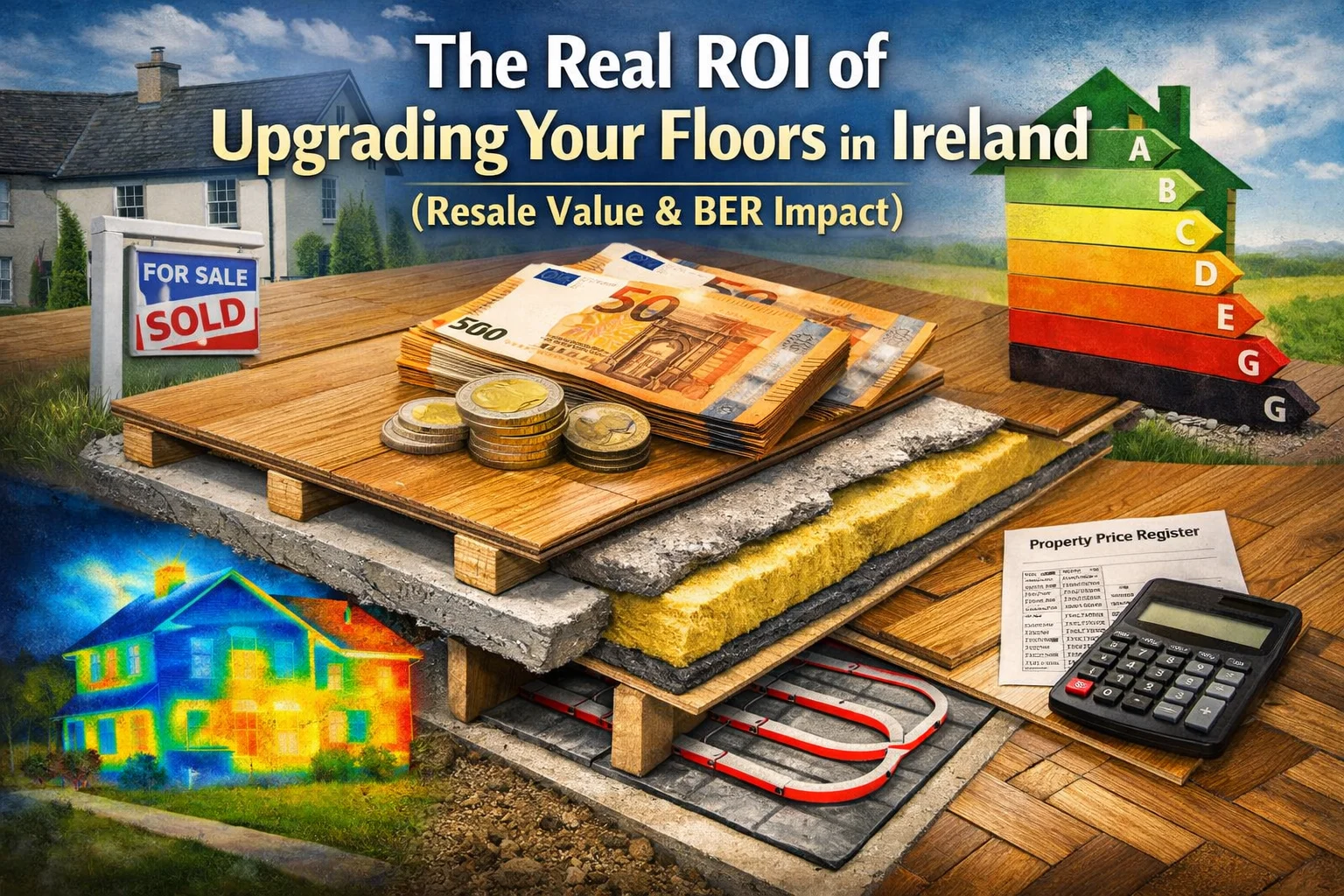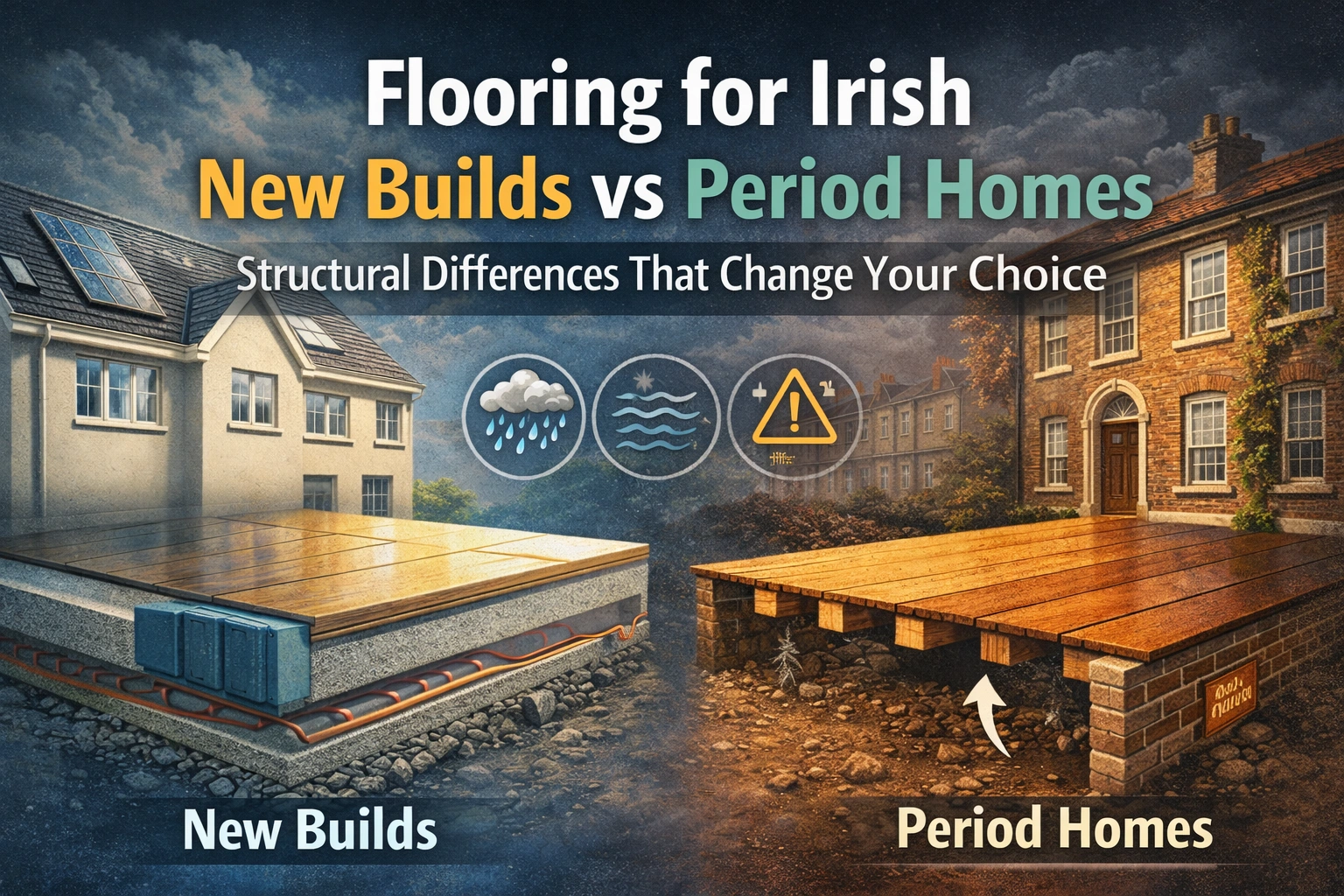Introduction
Hardwood flooring has long been the mark of elegance, durability, and timeless style in Dublin’s homes and businesses. Whether you live in a Georgian townhouse in Ballsbridge, a modern apartment in Clontarf, a family semi-D in Tallaght, or you manage a busy commercial space in the city centre, the right hardwood floor can completely transform your property’s look and feel.
This guide goes beyond generic advice — it’s built for Dublin homeowners, landlords, and business owners who want to make smart, lasting investments. You’ll discover exact € price ranges, the best wood types for our climate, what to expect from installers, and even commercial slip-rating guidance for offices, restaurants, and retail units. Plus, we’ll reveal the hidden Dublin-specific factors that can make or break a flooring project — from moisture in older homes to parking and access charges in high-traffic zones.
Quick Answer — At a Glance
If you’re in Dublin and want hardwood flooring that lasts, here’s the quick breakdown:
- Best choice for most homes: Engineered oak — stable in Ireland’s changing humidity, suitable for underfloor heating (UFH), and comes in finishes from rustic to ultra-modern.
- Cost guide: Supply from €29.99/m² (entry-level engineered herringbone) to €85+/m² for premium European oak. Installation typically runs €30–€40/m².
- Timeline: 1–3 days for a standard 25 m² living room; up to 1–2 weeks for full-home or complex commercial installs.
- First steps: Choose the wood type, confirm subfloor condition (moisture test!), and get 3 local quotes from certified Dublin fitters.
Best Hardwood Flooring Types for Dublin Homes & Businesses
Engineered vs Solid Hardwood — What Works in Dublin
- Engineered hardwood is layered for stability, meaning it handles Dublin’s fluctuating humidity better — especially in coastal areas like Howth or Dun Laoghaire. It’s the go-to for apartments, new builds, and UFH systems.
- Solid hardwood offers unmatched longevity and can be sanded many times, making it ideal for heritage restorations in Rathmines or Ranelagh. However, it requires stable humidity and may need extra moisture control in older or damp-prone properties.
Sales tip: If you have UFH or a modern extension, lean towards engineered. For period homes with proper subfloor ventilation, solid oak or maple can add significant value.
Parquet & Herringbone — Dublin’s Heritage Statement
Herringbone and chevron patterns are seeing a huge revival, especially in restored Georgian and Victorian properties in Dublin 2, Dublin 4, and Dublin 6.
- Adds architectural depth and a high-end feel.
- Labour-intensive install — expect 15–20% more cost than straight-lay planks due to cutting and waste.
- Best fitted by installers experienced with Dublin’s sometimes uneven subfloors.
Commercial Hardwood Applications
In restaurants, offices, and retail units across Dublin City Centre, Grafton Street, and Sandyford, hardwood must meet slip-resistance and traffic-wear demands:
- Slip rating: Aim for R9–R10 for most public spaces.
- Finish: UV-cured oil or high-traffic lacquer for resilience.
- Wood type: Harder species like oak, maple, or ash; engineered for stability in high-footfall areas.
| Type | Durability | Moisture Tolerance | UFH Compatible | Typical Supply Cost (€) | Maintenance Needs |
|---|---|---|---|---|---|
| Engineered Oak | High | Good | Yes | 35–85/m² | Low–Medium |
| Solid Oak | Very High | Fair | No* | 45–90/m² | Medium–High |
| Parquet (Engineered) | High | Good | Yes | 40–95/m² | Low–Medium |
| Parquet (Solid) | Very High | Fair | No* | 50–100/m² | Medium–High |
Cost Breakdown in Dublin (Transparent € Ranges)

Hardwood flooring budgets in Dublin depend on material, installation method, and site factors like parking, lift access, and subfloor prep.
Materials + Installation
- Supply: €29.99/m² (promo engineered herringbone) to €100+/m² (premium solid walnut).
- Installation labour: €30–€40/m² for standard plank; +15–20% for parquet/herringbone.
- Underlay: €2.25–€6/m² (acoustic or thermal).
- Skirting & trims: €5–€12/m (supply & fit).
- Door trimming: €15–€25 per door.
- Stairs nosing: €25–€45 per step.
- Levelling compound: €8–€15/m².
- Moisture barrier/DPM: €3–€7/m².
- Removal/disposal of old flooring: €10–€15/m².

Worked Example — 25 m² Living Room in Dublin 6
- Engineered oak supply: €55/m² → €1,375
- Install labour: €35/m² → €875
- Acoustic underlay: €3/m² → €75
- Skirting/trims: €180
- Door trimming (2 doors): €40
- Total: €2,555 (ex-VAT, incl. materials & labour)
Worked Example — 70 m² 2-Bed Apartment in Clontarf
- Engineered oak supply: €45/m² → €3,150
- Install labour: €33/m² → €2,310
- Acoustic underlay: €4/m² → €280
- Levelling compound (10 m²): €120
- Skirting/trims: €500
- Door trimming (5 doors): €100
- Total: €6,460 (ex-VAT, incl. materials & labour)
Dublin-Specific Factors That Affect Quotes
- Parking & Access: Pay-and-display in City Centre; permit zones in Rathmines, Drumcondra.
- Lift access: Adds handling time; common in Docklands apartments.
- Older homes: May need extensive levelling or DPM upgrades.
- High moisture areas: Coastal suburbs (Howth, Dun Laoghaire) may require extra acclimatisation and vapour barriers.
Subfloor & Site Preparation: Building the Perfect Dublin Hardwood Floor
The secret to a beautiful hardwood floor in Dublin isn’t just the timber you choose — it’s what lies beneath it. Skimp on preparation, and you risk squeaks, warped boards, and costly repairs. This is especially true in older Georgian terraces and apartment blocks where strict acoustic rules are non-negotiable.
Moisture Testing in Dublin’s Maritime Climate
Dublin’s damp, ocean-kissed air makes moisture control a make-or-break step. In Ireland, the go-to method for concrete slabs is Relative Humidity (RH) testing, carried out with in-situ probes under ASTM F2170 or BS 8201 standards.
Some fitters still trust the Carbide Method (CM) for its accuracy with both concrete and screed.
Moisture thresholds matter: engineered hardwood can handle up to 75% RH, but solid hardwood prefers 65% or less. In coastal neighbourhoods like Sutton or Dún Laoghaire, ground slabs may need extra drying time — even during warm spells.
Levelling, Screeds & Damp Proof Membranes
Flatness is everything. If the subfloor dips or peaks more than 3 mm over two metres, a levelling compound (€8–€15/m²) is essential.
Cement-based screeds dry at about 1 mm per day, while anhydrite screeds are slower at roughly 0.5 mm.
For damp protection, fit a 300 μm (1200-gauge) polythene Damp Proof Membrane and link it seamlessly to the wall’s DPC. In certain postcodes, a radon barrier is also mandatory — check the TGD-C map before you start.
Acoustic Underlay in Apartment Living
Soundproofing is more than a courtesy in multi-unit buildings — it’s the law. Part E of the building regulations demands that impact noise between homes stays below an L’nT,w of 58 dB.
High-density acoustic underlays (≥ 19 dB impact reduction), perimeter isolation strips, and properly sealed expansion gaps are the gold standard. In areas like the Docklands, Clontarf, and Tallaght, Owners’ Management Company rules can be even stricter.
Underfloor Heating & Acclimatisation
If your home has underfloor heating, run the system for 7–10 days beforehand, then switch it off 48 hours before installation.
Let the boards settle: engineered hardwood needs at least 48 hours in place, while solid hardwood benefits from 5–7 days in heated conditions. For stability over UFH, avoid planks wider than 180 mm.
Picking the Right Installation Method
Floating Installation works well for engineered hardwood over underlay — quick, cost-effective, and great for apartments that need an acoustic layer.
Glue-Down is the choice for parquet designs, busy commercial spaces, or anywhere maximum stability is required. It eliminates hollow sounds and performs well over both concrete and ply.
Nail-Down is the traditional route for solid hardwood over timber joists, especially in Dublin homes built before 1960. It’s rock-solid and built to last for decades.
Expansion Gaps, Doorways & Thresholds
Always leave a 10–15 mm expansion gap around the room’s edge. Use colour-matched thresholds to transition between spaces, and factor in door trimming — typically €15–€25 per door.
Quality Checks Before Signing Off
When the job is finished, look for:
- Even joints with no raised edges.
- Expansion gaps neatly covered, never filled.
- Boards joined tightly, following the same grain direction.
- Fully bonded acoustic underlay, if fitted.
- A clean workspace, free of debris.
Compliance, Warranties & Protection
Ireland’s Part E governs apartment acoustics, Part C handles damp protection, and Part L ensures energy efficiency — particularly important with UFH.
Product guarantees vary: engineered hardwood typically carries 15–30 years of structural cover and 3–5 years on finishes, while solid hardwood can last a lifetime if cared for. Skilled installers often back their work with a 12–24 month guarantee.
Ask about public liability insurance (around €6.5m is standard) and check for memberships in bodies like the NWFA or the Irish Timber Council — they’re signs of professionalism.
How to Choose a Dublin Flooring Installer
Look for a portfolio that matches your project type, whether it’s an apartment acoustic retrofit, a Georgian restoration, or a commercial fit-out. Always check client references, and make sure they know the local regulations and by-laws.
A clear enquiry email helps, or you can contact us to find the installer for you… You can contact us and please do not worry, we will deal with the rest, from product to installer, to provide full services with affordable costs.
Hi [Installer Name],
I’m planning to install [Engineered/Solid] hardwood flooring in my [home/apartment/commercial space] in [Dublin area].
Could you quote for supply, installation, underlay, skirting, and any subfloor preparation needed?
Compliance with [Part E acoustics / UFH compatibility / moisture testing] is a must.
Best regards,
[Your Name]
Our email to contact: info@fbsflooring.ie
Service Areas Covered
- Southside: Ballsbridge, Donnybrook, Rathmines, Ranelagh, Blackrock, Dún Laoghaire, Sandyford, Stillorgan, Dundrum.
- Northside: Clontarf, Raheny, Sutton, Howth, Drumcondra, Glasnevin, Swords.
- City Centre: Temple Bar, Smithfield, Docklands, Grand Canal.
- West Dublin: Lucan, Blanchardstown, Castleknock, Tallaght, Palmerstown.
- Commuter Belt: Bray, Greystones, Maynooth.
Commercial Hardwood Flooring in Dublin
Hardwood is a favourite in business premises for its refined look, long-term durability, and ability to be refinished when needed.
For public spaces, aim for R9–R10 slip resistance, with matte lacquer or UV-cured oil balancing safety and easy cleaning. In high-traffic retail or hospitality, go for Class 33 or above — engineered boards with dense cores resist dents best.
Real-World Examples:
- A Temple Bar restaurant chose engineered oak with UV oil — safe underfoot, easy to clean after a late shift.
- An office in Sandyford opted for engineered maple with acoustic underlay to meet Part E, creating a bright, modern feel.
- A boutique on Grafton Street installed solid oak parquet, turning the floor itself into part of the brand’s luxury appeal.
Maintenance & Aftercare for Hardwood Flooring in Dublin
A hardwood floor can look stunning for decades — but only if you know how to care for it in Dublin’s unique climate.
Why Care Matters in Dublin
Hardwood flooring isn’t just a purchase; it’s a long-term investment in your home’s style and value.
Here in Dublin, the weather swings between damp, mild winters and the occasional burst of summer heat. That constant shift means seasonal care isn’t optional — it’s essential if you want to avoid warping, gapping, or costly repairs.
Daily & Weekly Cleaning Habits
Keeping grit and dust at bay will save your floor’s finish for years.
- Daily or weekly: Sweep with a soft-bristled broom or vacuum using a brush head that won’t scratch.
- Once a month: Lightly damp-mop with a pH-neutral hardwood cleaner. Always wring out your mop well — the boards should never be soaked.
- Avoid at all costs: Steam mops, ammonia-based solutions, or harsh abrasive pads. They can dull the finish and damage the wood fibres.
Adjusting for the Seasons
Dublin homes experience humidity swings that can make hardwood expand in summer and contract in winter.
- In winter: Central heating can dry boards out. A humidifier helps maintain balance.
- In summer: If humidity spikes, a dehumidifier will stop planks from swelling.
- For underfloor heating: Keep temperature changes gradual. Sudden heat can shock the wood and cause cracks.
Refinishing Timelines
Every hardwood floor will eventually need a refresh.
- Engineered hardwood: Sand and refinish every 10–15 years, depending on top-layer thickness.
- Solid hardwood: Expect to refinish every 7–12 years — sooner in busy commercial spaces.
The right schedule keeps the surface resilient and looking as good as the day it was fitted.
Aftercare Essentials
A few simple habits will protect your floor for the long haul:
- Fit felt pads under all furniture legs.
- Lay mats at entrances, especially during Dublin’s rainy months.
- Wipe spills the moment they happen.
- Check skirting boards and thresholds once a year for gaps or wear.
Real-World Examples
Grand Canal Dock – Acoustic Constraints Solved
A modern apartment owner needed engineered oak with Part E acoustic compliance. We fitted a 20 dB acoustic underlay and floating engineered planks. The result? No noise complaints and full approval from the management company.
Ranelagh – Restoring a Georgian Treasure
This period terrace had uneven joists and damp seeping from the basement. We laid a damp proof membrane, levelled the floor with ply, and installed solid oak on new battens. The transformation brought warmth and authenticity while respecting the building’s heritage.
Lucan – Wide Planks over UFH
A family wanted the beauty of wide-plank engineered oak with water-based underfloor heating. We advised keeping boards under 180 mm wide for stability. Ten days after commissioning the UFH, we installed the floor — delivering a cosy, stable finish perfect for winter.
Get Your Dublin Hardwood Flooring Quote
If you’re planning to upgrade an apartment, restore a period home, or fit out a commercial space, our Dublin network of professional installers is ready to deliver flawless results — on time and within budget.
📞 Call us today or 📩 Request your free quote online
We’ll visit, assess your needs, recommend the best materials, and give you a clear, Dublin-specific quote so you can invest with confidence.
FAQs — Hardwood Flooring Dublin
Q: How much does fitting cost?
Labour typically runs €30–€40/m², plus materials. Parquet or herringbone patterns add 15–20% due to extra labour.
Q: Is engineered wood suitable for underfloor heating?
Yes, most engineered hardwood works well as long as the surface temperature stays below 27°C.
Q: Do I need a damp proof membrane?
If you’re installing over concrete or ground-level slabs, absolutely. Dublin’s moisture levels make it essential.
Q: Can hardwood be installed in apartments?
Yes — but you’ll likely need an acoustic underlay to meet Part E regulations.
Q: What’s best for rental properties?
Engineered hardwood with a tough lacquer finish. It’s durable and easy to maintain.
Q: Can it go over existing tiles?
Yes, provided the tiles are level, sound, and moisture-tested.
Q: How long does a 50 m² install take?
Expect 3–5 days including preparation — longer if levelling or moisture work is required.
Q: Do installers move furniture?
Many do for an additional fee. Always confirm during the quoting stage.


